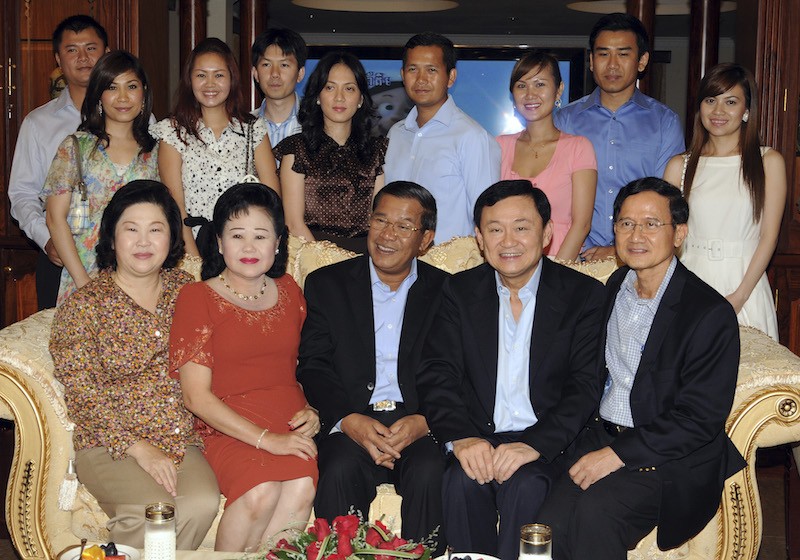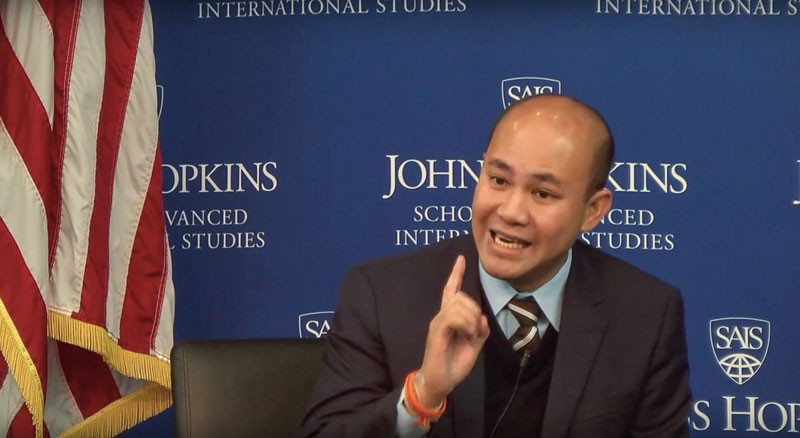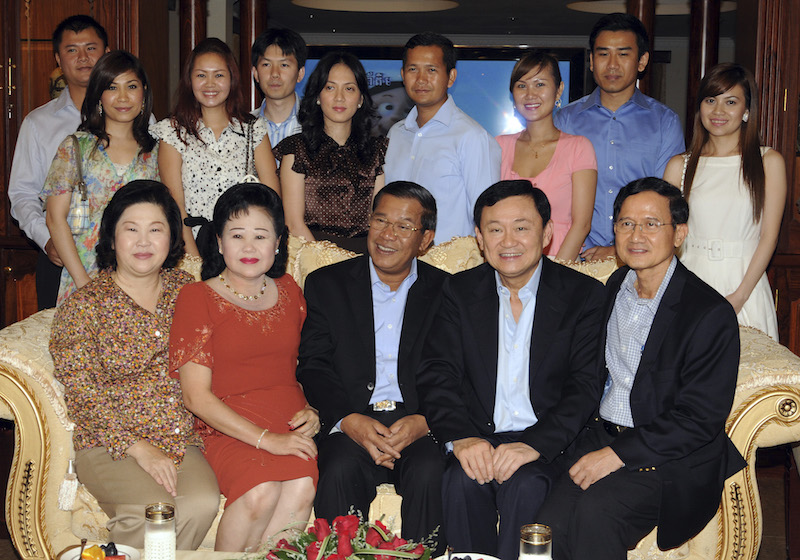On April Fool’s Day 2011, Prime Minister Hun Sen told the country that he earned less than $14,000 a year, amid a government campaign to get top officials to comply with a new anti-corruption law requiring them to declare their—sealed—assets.
The premier, widely accused of running one of the most kleptocratic regimes in the world, added cheekily: “I will receive support from my children. I will not let myself die.”

As it happens, his children and extended family have significant shares in more than 100 companies with a combined capital of over $200 million in sectors spanning the economy, “the tip of the iceberg,” according to a new Global Witness report that sheds light on the extent of the first family’s corporate empire.
In “Hostile Takeover,” released today, the London-based rights group warns current and prospective foreign investors of the risks of making bedfellows of the companies—some of them accused of abusing the law with impunity—in a highly corrupt environment under Mr. Hun Sen’s virtually unchecked control.
“Doing business with companies that are owned or controlled by the country’s ruling family not only raises ethical questions. It also carries significant legal, financial and reputational risk. It is in everyone’s best interest for investors in Cambodia to carry out careful checks to ensure that their money isn’t being funnelled into Hun Sen’s campaign of oppression,” Stephen Peel, a Global Witness board member and former private equity firm partner, says in the report.
“His family has Cambodia’s economy so sewn up that Phnom Penh residents are likely to struggle to avoid lining the pockets of their oppressors multiple times a day,” says the group’s co-founder, Patrick Alley. “Foreign investors, on the other hand, can and should opt out of bankrolling a regime that kills, intimidates and locks up its critics.”
Mostly by mining the Commerce Ministry’s public corporate filings, available online, Global Witness linked 21 of Mr. Hun Sen’s relatives—from his children and siblings to in-laws, nephews, nieces and their spouses—to 114 local companies that they either own, chair, direct or invest in. The firms span 20 sectors, from finance to forestry, and have partnerships with major international brands, including Apple and General Electric.
Global Witness says its findings likely only scratch the surface, as the filings don’t systematically list all directors and shareholders, and because the Commerce Ministry posts only officially declared holdings. As the report notes, Cambodia’s elite are widely believed to hide much of their corporate interests behind associates, shell companies and fake names.
As for what is listed, the prime minister’s eldest daughter, Hun Mana, is queen of the family’s business dynasty.
Ms. Mana is perhaps best known for her media holdings, including the popular Bayon TV and Kampuchea Thmey Daily newspaper, both part of a traditional media environment firmly in the hands of the first family and its allies.
Commerce Ministry records, however, tie her to 22 companies in total, 18 of them as chair or director, with a listed share capital of $66.7 million. Besides her media holdings, they include: the advertising firm Moon Media; The Museum Company, which manages the Angkor National Museum in Siem Reap City; Vital Premium Water, which the Tourism Ministry recommends for official ceremonies; the Royal Group Investment Company; and Cambodia Electricity Private, which sells to state energy provider Electricite du Cambodge.
Other prominent Hun family businesspeople in the records include: Hun Sengny, the prime minister’s sister; Hun Chantha and Hun Kimleng, daughters of the prime minister’s brother Hun Neng; Pich Chanmony and Yim Chhay Lin, the wives of the prime minister’s sons Hun Manet and Hun Many, respectively; and Sok Puthyvuth, the husband of the prime minister’s daughter Hun Maly.
The report does not present any definitive evidence that the family obtained or expanded its business interests illegally but highlights some of the alleged legal and rights abuses by some of the firms, all reported on in recent years.
In 2013, officials at the SL garment factory in Phnom Penh identified Hen Sengny as the owner of Garuda Securities, which was providing the factory with security guards accused by a local union of physically attacking workers during a strike.
In 2010, an employee of HLH Agriculture identified Ms. Sengny as the firm’s director. Officials in Kompong Speu province, where the firm operates a corn plantation, corroborated the business link, according to rights workers and local residents, who have accused the firm of illegally logging the area.
Yim Leang, a brother-in-law of Mr. Many, the prime minister’s youngest son, has a stake in Khun Sear Import Export, which was involved in a bitter land dispute over a plot of land it coveted in Phnom Penh’s Tuol Kok district. The family living on the land accused the company of hiring the thugs who physically attacked them and, on one occasion, threw a bag of venomous snakes through their window. After the dispute landed the father and daughter in jail, they settled with the company and moved out.

The Commerce Ministry records also list Hun Manith, the prime minister’s second son, as a director of Cambodia Electricity Private, along with his sisters Ms. Mana and Ms. Maly. As a military officer, though, Major General Manith is barred from sitting on a company’s board of directors by the Law on the General Statute of Military Personnel.
The largest single group of companies tied to the family are trading firms involved in what the report describes as one of the most corrupt business sectors in the country. Cambodia’s imports and exports in 2013 added up to some $18 billion, according to the World Bank. That same year, Global Financial Integrity estimated that the country lost $4 million in illicit financial flows, almost all of it the result of falsely filled out trade invoices.
Global Witness says it sent requests for comment to the people mentioned in the report and heard back from only one: Mr. Puthyvuth, the husband of Ms. Maly and son of Deputy Prime Minister Sok An.
Commerce Ministry records link Mr. Puthyvuth to seven companies, including the Soma Group, as CEO. They list him, too, as director of Soma Construction & Development, which is involved in the multimillion-dollar expansion of Phnom Penh International Airport, a project embroiled in a years-old land dispute with local residents.
Global Witness also uses a biomass deal the Soma Group struck with General Electric in 2012, part of an alternative energy agreement the government made with the U.S. firm the year before, as an example of the public contracts and state licenses the Hun family has secured.
Addressing the report’s claims about the family’s undue influence over corporate Cambodia in an email to Global Witness in February, Mr. Puthyvuth said he had seen “again and again that the good solutions are seldom implemented correctly” but blamed this on the government’s “limited capacity.”
“I can understand your assumption that I have abused my power to get to where I am today, but I can assure you that I take seriously the challenge of building a responsible and respected private sector group. I admit it is a work in progress. However, I have built a good team, who I believe share my vision to help develop Cambodia,” he said.
“I understand that I live in the shadows of my family. The business that I am building aims to embrace new ideas for our country and to provide solutions that I believe will help the development of my country.”

Reached on Wednesday, Mr. Many, the prime minister’s youngest son and an elected lawmaker, declined to speak over the telephone and asked that any interview request be made in writing and submitted via the National Assembly. His brother, Maj. Gen. Manith, did not reply to a request for comment.
Global Witness is releasing “Hostile Takeover” along with a public, searchable database called Cambodia Corporates.
“It should be used as a key starting point for due diligence processes, enabling investors to gauge the level of risk by seeing who they are getting into bed with,” it says.
“Without this resource, they will struggle to determine who profits from their investment, leaving them exposed to significant legal and financial risk. More importantly, using the database will help them to identify whether their investment is helping fuel corruption, human rights abuses, social injustice or environmental crime and what damage it could do either to ordinary people in Cambodia or their own reputation.”
Foreign companies wanting to invest or do business in Cambodia usually have to go through the Council for the Development of Cambodia, a body chaired by Mr. Hun Sen himself.
Officials at the council, including its public relations and legal teams, either declined to discuss the report or did not reply to requests for comment.




